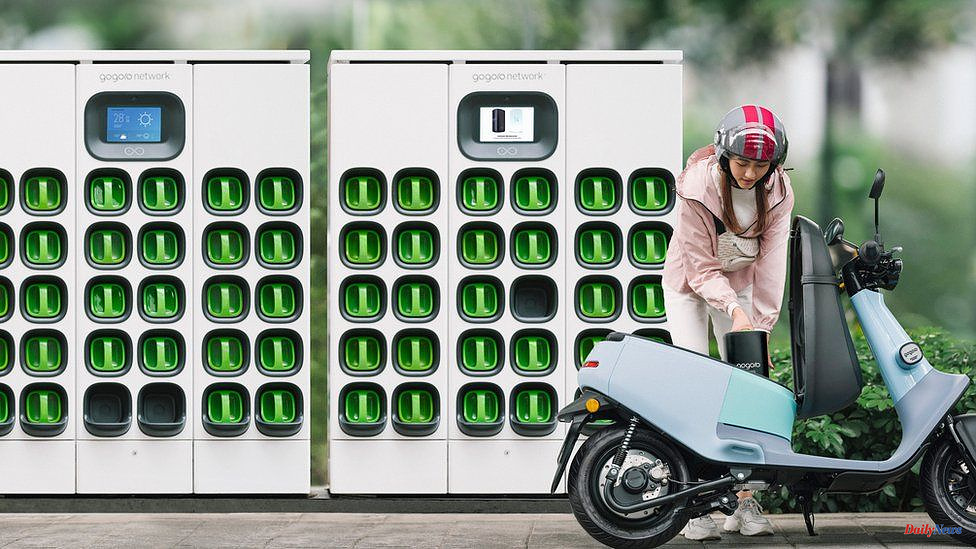In the UK, the term "electric vehicle” immediately conjures up images like a Tesla or another similar car. But, across Asia, the fight for EV dominance has been waged on motorbikes.
You'll notice motorcycles buzzing about in most Asian countries.
It can often function much like a family car, but it is also far more affordable. You may see two-wheelers carrying entire families, no matter where you are, in Taiwan, India, Cambodia, India or Indonesia.
Asia is home to more than half the global motorbike sales. In some countries, it is not common for a family not to own one.
Thailand is the country with the most motorcycle per capita. 87% of households have at least one motorcycle. These are usually the scooter type, in which the rider is seated with his or her feet in front.
For households with motorbikes, Thailand follows closely behind Indonesia (86%), Vietnam (85%) and Malaysia (83%). These numbers drop to 60% and 47% in India and China, but still surpass the 7% of the UK.
Motorbikes in Asia are overwhelmingly powered by petrol. However, experts believe that there is a growing demand for electric motorbikes.
Arushi Kotecha is an automotive analyst with global research group Economist Intelligence Unit. She says, "We see enormous scope for growth [in electric motorbike sales], especially in Asia for the following reasons."
"The first is the personal disposable incomes. This is especially true for markets such as India and Southeast Asia. It makes it difficult to afford cars.
"Especially in a time such as this, when fuel and food inflation are so high. This would increase the cost of owning an electric vehicle. We believe that switching to electric [motorbikes] is much easier.
Ms. Kotecha says that electric motorbike sales in Asia could increase by three to fourfold by the end of the decade and global demand will rise by the same amount.
One report from earlier this year predicted that the worldwide sales of electric bikes would double to $15.73bn (PS13bn), in 2020, and $30.52bn by 2030.
China is currently the world's largest producer of electric scooters and motorbikes.
NIU Technologies in Beijing, China is one of the largest producers. It launched its first models back in 2015. Joseph Constanty is the director of global strategy at the firm. He describes the company as "if Tesla [well-known Italian scooter maker] had a child".
According to him, electric motorbikes were not a new concept in China. They used lead-acid batteries. NIU was the first company to sell electric bikes in the country, according to Mr Constanty. It uses the same lithium batteries as you would find in your Tesla or mobile phone.
"So, we were really the first to enter the Chinese market, and globally, at that time. He says that we were able dive into this space.
China's government is offering incentives and promotion to encourage electric motorbike sales. In other countries like Cambodia and Laos however, the industry is starting from zero.
Tu Le, the founder and managing director at Chinese automotive analysis firm Sino Auto Insights says that there are still many kinks before electric motorbikes become widespread in Asia. The need for multiple charging stations makes electric motorbikes a difficult option in rural areas.
The big Japanese motorbike makers Yamaha and Honda have begun to make electric models. However, newer companies are leading the Asian market.
One such company is Taiwan's Gogoro. It offers a variety of electric motorbikes and a solution for riders who have to wait while their bikes charge.
Gogoro users in Taiwan don't need to charge at charging points. Instead, they can simply drive to any of the more than 2,200 stations and swap their batteries free of cost. These outdoor stations are open 24 hours a day and can withstand the intense heat and typhoons of Taiwanese summers.
Gogoro plans to make the battery-swapping technology and hardware available to its partner companies in Asia. These include Hero India, Gojek Indonesia, Yadea China, and DCJ. Yamaha is also in talks with Gogoro.
The series New Tech Economy explores how technological innovation will shape the future economic landscape.
Horace Luke is Gogoro’s chief executive. He says that the company wants to be the "Android” of electric motorbikes, providing the invisible scaffolding to other brands. Luke compares it to the mobile telephone system, which encourages innovation and gives device makers more freedom to personalise their phones. Gogoro plans to share its battery management software which extends the life of the batteries.
While some companies in this sector have big dreams, others have had to deal with some serious problems. After one of its electric motorbikes caught on fire, Ola Electric, an Indian company, made national headlines.
Okinawa and Jitendra New EV Tech, two other Indian electric motorbike companies, also reported fires last year. All of these fires were put out by faulty batteries.












